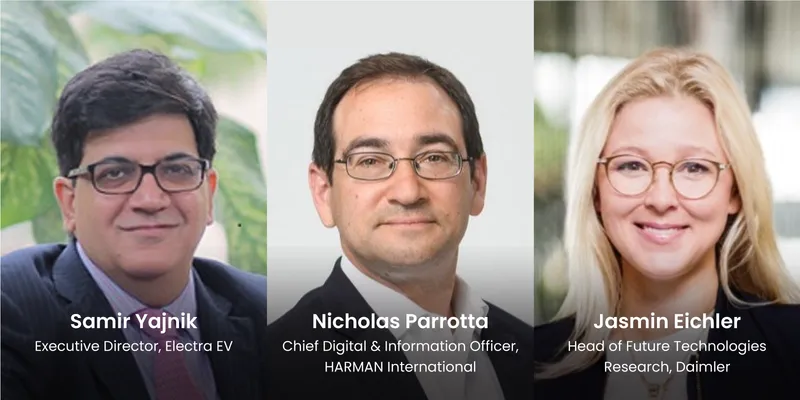India has a vital role to play in electric mobility R&D: Eichler
Jasmin Eichler, Head of Future Technologies Research, Daimler, said the future of electrification depends on full commitment to vehicle-electrification.
India will play an important role in electric mobility R&D and developing innovations for the rest of the world, said Jasmin Eichler, Head of Future Technologies Research, Daimler.
“The future of electrification depends on full commitment to (vehicle) electrification,” Eichler said, at the Nasscom Design and Engineering R&D Summit 2021. It will give a boost to technologies and innovations that are under development, and can be the future of electrification, she added.
The convergence of vehicle-electrification, connectivity, and automation has increased manifold, leading to several business models emerging, said Samir Yajnik, Executive Director of Electra EV, who was on the panel to discuss 'Preparing for the Dynamic Mobility Engineering', with Eichler and Nicholas Parrotta, Chief Digital and Information Officer, Harman International.

Parrotta pointed out that the number of use-cases and business models of electric mobility has grown exponentially across countries and regions. "Customisation is critical now, and the technologies will have to evolve to work in a synchronised way," he said, citing charging infrastructure for electric vehicles as a case in point.
The panel agreed that connected and autonomous mobility are bringing together myriad technology themes like artificial intelligence (AI), machine learning (ML), internet of things (IoT), and battery technology, while meeting the market demand.
"Original equipment manufacturers are being challenged with the combination of technologies to meet the demand," Yajnik said. "As the use-cases become more crystallised, standardisation will happen."
Eichler noted that the combination of technologies has also made sustainability a global movement.
"For true transformation and to ensure sustainability, a transparent supply chain and having the right talent are essential," she said. "This would enable optimisation of the whole ecosystem, and efficiency in the automobile industry."
“Collaboration is the key,” said Parrotta of Harman International, a global leader in connected car technology, design and analytics. "Customer experience is crucial for companies to learn fast. Fail fast, iterate, and develop the business model to grow," he said.
An open dialogue and rapid prototyping are essential for personalisation of electric-mobility services, Parrotta said. “What has become important is to understand what is needed and in demand to be able to provide a personalised service,” he added.
The Engineering R&D industry in India generated $31 billion in revenue in 2020-21, according to trade body Nasscom's estimates. The global engineering R&D market declined 6 percent to $1.17 trillion in 2020.
The panelists said connected and autonomous mobility will give a big push to digital engineering, and higher adoption of cloud on account of the rise of connected platforms and 'as-a-service' models.
"Increasing maturity and applications of technologies like AI/ML, IoT/Edge, industrial robotics, additive manufacturing, etc. has led to a shift in ER&D spend from the more conventional engineering (electric, mechanical) to digital," Nasscom said in its 2021 Strategic Review on the global engineering R&D industry.
Edited by Kunal Talgeri






